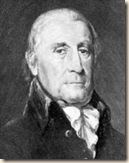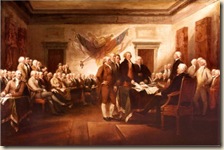232 years ago, 56 men pledged their lives, their fortunes, and their sacred honor to the cause of liberty and freedom. I wonder how many Americans today would be willing to do that? Most people don’t even realize the significance of that phrase. We’re so familiar with the words lives, fortunes, and sacred honor that we never think about what they really mean. It wasn’t just a superfluous way of signing a document. They were truly pledging their lives, fortunes, and sacred honor. And indeed, many of the signers sacrificed their fortunes, and some even their lives or the lives of family members.
 Take for example Francis Lewis, signer of the Declaration from New York. His home was plundered and destroyed by British troops, his wife was taken captive and kept prisoner under horrible conditions. She was exchanged just a few months later, but her health had been so severely damaged during her imprisonment that she died shortly afterward.
Take for example Francis Lewis, signer of the Declaration from New York. His home was plundered and destroyed by British troops, his wife was taken captive and kept prisoner under horrible conditions. She was exchanged just a few months later, but her health had been so severely damaged during her imprisonment that she died shortly afterward.
Here is an excerpt from a speech written by Rush H. Limbaugh, Jr. (father of the political talk-show host Rush Limbaugh) telling about the sacrifices the signers made for their country:
Of those 56 who signed the Declaration of Independence, nine died of wounds or hardships during the war. Five were captured and imprisoned, in each case with brutal treatment. Several lost wives, sons or entire families. One lost his 13 children. Two wives were brutally treated. All were at one time or another the victims of manhunts and driven from their homes. Twelve signers had their homes completely burned. Seventeen lost everything they owned. Yet not one defected or went back on his pledged word. Their honor, and the nation they sacrificed so much to create is still intact. And, finally, there is the New Jersey signer, Abraham Clark.
He gave two sons to the officer corps in the
Revolutionary Army. They were captured and sent to that infamous British prison hulk afloat in New York Harbor known as the hell ship Jersey, where 11,000 American captives were to die. The younger Clarks were treated with a special brutality because of their father. One was put in solitary and given no food. With the end almost in sight, with the war almost won, no one could have blamed Abraham Clark for acceding to the British request when they offered him his sons' lives if he would recant and come out for the King and Parliament. The utter despair in this man's heart, the anguish in his very soul, must reach out to each one of us down through 200 years with his answer: "No."
One thing that stands out in the phrase lives, fortunes, and sacred honor is the fact that they listed their lives and their fortunes, but it was only their honor that they held to be sacred. Honor was a thing to be prized above fortune and life. Life and fortune were things that could be taken from you, but no one could take your honor from you. As journalist and educator William Lyon Phelps said,
"You can be deprived of your money, your job and your home by someone else, but remember that no one can ever take away your honor."
Today in our society we have lost the concept of what true honor is. Webster's 1828 dictionary defines honor as "Reputation; good name... True nobleness of mind; dignified respect for character..." I think this succinctly sums up what true honor really is. As Thomas Jefferson said,
"Nobody can acquire honor by doing what is wrong."
To us, the founding generation, living in a society and culture that hardly resembles our own, may seem irrelevant to us. But there are many lessons still to be learned from their generation; from their successes and their failures, from their strengths and their shortcomings. Philosopher and poet George Santayana (1863-1952) summarizes it well,
"Those who cannot remember the past are condemned to repeat it."
But not only can we hope to avoid their mistakes, we can also build upon and imitate the good and noble things that they did, in their public and private lives. Sadly, most Americans have no knowledge of men like Patrick Henry, Benjamin Rush, John Witherspoon, and Nathaniel Greene. These are the men who should be our heroes and role models, but instead, we look to Hollywood for the heroes of today.
We are forgetting and forsaking the incredible legacy left to us by our Founding Fathers. It has been cast aside and disdained by this generation. But we must honor and remember that legacy that has been given to us as Americans. America is facing hugely important issues today: abortion on demand is growing more and more acceptable (see this article by Dr. Albert Mohler), traditional marriage is being destroyed, our borders remain unprotected while thousands of illegal immigrants pour into our country, and it is very possible that Barrack Hussein Obama will be the next president of the United States.
We cannot just stand by and watch as our country crumbles into the ash heap of history. I think what George Washington told the Continental Army after the signing of the Declaration applies to us today:
"The fate of millions will now
depend, under God, on the courage and conduct of this army. Let us therefore rely upon the goodness of the cause, and the aid of the supreme Being, in whose hands victory is, to animate and encourage us to great and noble actions -- The eyes of all our countrymen are now upon us, and we shall have their blessings, and praises, if happily we are the instruments of saving them from tyranny mediated against them."
And with the passing in recent years of such great men as Bill Buckley, Jerry Falwell, and D. James Kennedy, we have huge shoes we must fill. We must begin to reclaim America by standing firm for the truth, for as Edmund Burke so eloquently put it,
"The only thing necessary for the triumph of evil is for good men to do nothing."
"We will preserve for our children this, the last best hope of man on Earth, or we will sentence them to take the last step into a thousand years of darkness." (Ronald Reagan, A Time for Choosing speech, 1964). If our generation does nothing to stop the decay and destruction of our liberties and freedoms, we will plunge future generations into "a thousand years of darkness." We must not allow our liberties to be taken from us, for liberties once lost are not easily regained.
So I will leave you with the following stanza from the poem The Rising of 1776 by T.B. Read.
"Who dares?" -- This was the patriot preacher's cry,
As striding from the pulpit he came, --
"Come out with me, in Freedom's name,
For her to live, for her to die?"
A hundred hands flung up reply,
A hundred voices answered, "I!"
Recommended reading:
A Time for Choosing (1964), by Ronald Reagan
The Americans Who Risked Everything, by Rush H. Limbaugh, Jr.
Whence Independence?, by Pat Boone
Was the Revolution a Biblically Justified Act?, by David Barton
America Is Not An Accident, by Tom Delay
Christians vs. Deists, by Dr. Joe Morecraft – CD
1776, by David McCullough




4 comments:
Great post, Joseph!
Very good post Joseph!
Joesph,
That post brought tears to my eyes. We take honor so lightly in this country. How much we owe to those who came before us!
Thank you for so eloquently honoring our forefathers and challenging our culture!
Mrs. Discher
Excellent post - it is saddening to think that those real patriotic and chivalrouse men who were rather commonplace during the revolutionary time-period are nearly extinct in today's culture. T
he man who lost his two sons to the prison ship, contrasted to nearly any of today's leading politicians, is a stark reminder of how far America as a nation has fallen.
Kepp up the fantastic posts!
Post a Comment